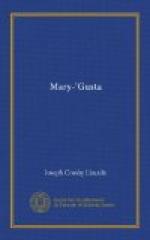“You did? Why, Uncle Shad!”
“Yes. I told ’Rastus I’d credit his account with it, but I don’t know’s I hadn’t ought to give it back to the summer feller. Anyhow, gettin’ it was a shock, same as I said at the beginnin’. ‘Rastus says he’s goin’ to sue me. I told him I’d have sued him long ago if I’d supposed he could steal a dollar, let alone borrow one.”
CHAPTER XXII
It was late in August when Mary received the letter from Crawford in which he told of his determination to wait no longer but to tell his father of his love for her. Edwin Smith was much better. By way of proof, his son inclosed a photograph which he had taken of his father sitting beneath a tree on the lawn of their home. The picture showed Mr. Smith without his beard, which had been shaved off during his illness. Either this or the illness itself had changed him a great deal. He looked thinner and, which was odd under the circumstances, younger. Mary, looking at this photograph, felt more than ever the impossible conviction that somewhere or other at some time in her life she must have met Mr. Edwin Smith.
So, in my next letter [wrote Crawford], I shall have news to tell. And I am sure it will be good news. “Ask your father first,” you said. Of course you remember that, and I have remembered it every moment since. Now I am going to ask him. After that you will give me your answer, won’t you? And it can’t be anything but yes, because I won’t let it be.
What Mary’s feelings were when she received this letter, whether or not she slept as soundly that night and other nights immediately following, whether or not the sight of Isaiah returning from the post-office at mail times caused her breath to come a little quicker and her nerves to thrill—these are questions the answers to which must be guessed. Suffice it to say that she manifested no marked symptoms of impatience and anxiety during that week and when at last Isaiah handed her another letter postmarked Carson City the trembling of the hand which received it was so slight as to be unnoticed by Mr. Chase.
She put aside the letter until that night when she was alone in her room. Then she opened it and read what Crawford had written. His father had not only refused consent to his son’s contemplated marriage but had manifested such extraordinary agitation and such savage and unreasonable obstinacy that Crawford was almost inclined to believe his parent’s recent illness had affected his mind.
That is the only explanation I can think of [he wrote]. It seems as if he must be insane. And yet he seemed rational enough at the beginning of our first interview and during most of the second. Even when I had broken the news that there was a girl in whom I felt an especial interest he did not show any sign of the outbreak that came afterward. It wasn’t until I began to tell how I first met




